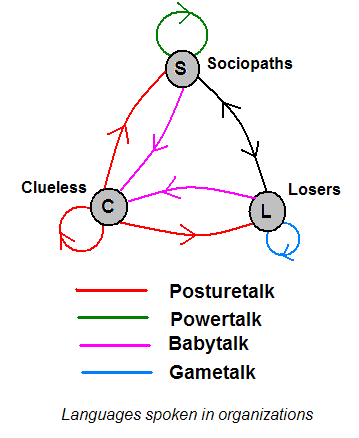Finally, Sociopaths and Losers speak rarely to each other at all. One of the functions of the Clueless, recall, is to provide a buffer in what would otherwise be a painfully raw master-slave dynamic in a pure Sociopath-Loser organization. But when they do talk, they actually speak an unadorned language you could call Straight Talk if it were worth naming. It is the ordinary (if rare) utilitarian language of the sane, with no ulterior motives flying around. The mean-what-you-say-and-say-what-you-mean stuff between two people in a fixed, asymmetric power relationship, who don’t want or need to play real or fake power games. This is the unmarked black triangle edge in the diagram.
Source: The Gervais Principle II: Posturetalk, Powertalk, Babytalk and Gametalk
I am re-reading the whole series, because it came up as a response to something I said on HN. Basically, I had reinvented this 3-layer dynamic from first principles, based on my observations of the past few years of my career. Now that someone pointed me back to it, I remember reading it originally, but this was written twelve years ago now.
Anyway, this passage really resonates with me. Every time I’ve gotten face time with a serious power broker in a company, this has been true. No games. No BS. Just straight down to business. I have something to say that will help the organization, and they’re ready to hear it and incorporate it. It never accomplishes the full intention, but I understand that they have a lot more pressures that I can see from my vantage point.
… for Sociopaths, conditions of conflict of interest and moral hazard are not exceptional. They are normal, everyday situations. To function effectively they must constantly maintain and improve their position in the ecosystem of other Sociopaths, protecting themselves, competing, forming alliances, trading favors and building trust. … They never lower their masks. In fact they are their masks. There is nothing beneath.
Though distant from our worlds, criminal worlds have the one advantage that they do not need to maintain the fiction that the organization is not pathological, so they are revealing to study.
For me, as a non-sociopath, this is a source of continual failing: to recognize that the the people pulling the levers of power in the organization are, in fact, sociopathic, and out for their interests, without regard for anyone else’s feelings or fortunes, not mine, or even necessarily the organization’s. Forgetting this base and simple fact has bitten me in the rear end more times than I can count.

